CitizenM Times Square Hotel
The brand’s first American outpost for the mobile citizen continues to shake up the outdated hotel industry

When citizenM announced they were opening their first American outpost in Times Square, we were a bit skeptical. After a stay, however, we were happily proven wrong—they’ve created an oasis in the middle of one of the most chaotic places in the world. From the futuristic-looking rooms to the Google Earth-printed carpet, the free Wi-Fi throughout the entire hotel to the artwork-covered living room (their term for the lobby), it’s clear that this is no cookie-cutter luxury hotel. We spoke with Chief Marketing Officer Robin Chadha (whose father Rattan founded the Amsterdam-based hotel group in 2008) about how the Dutch brand is disrupting the outdated hotel industry and reinventing the travel experience.
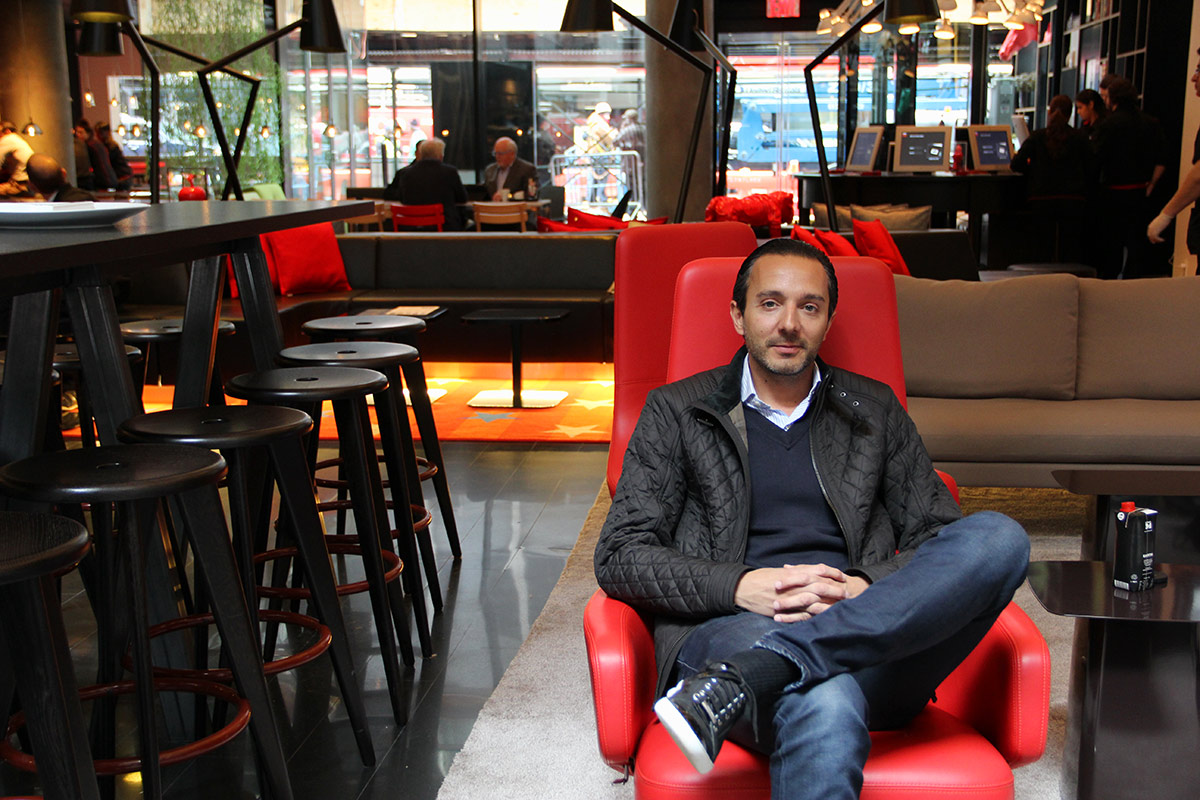
Chadha’s father was the founder of the global fashion company Mexx (sold off in 2001 to Liz Claibourne). “Mexx had a very strict policy when it came to expenses; they were only allowed to spend €100-150 a night on a hotel, which is impossible,” Chadha tells CH. “So all of these designers would come back very frustrated—they went to Paris Fashion Week but stayed at a crappy hotel outside the city. So that’s when the lightbulb went off in his head. How come there’s nothing hybrid in the world of hotels? How come there’s nothing which offers style, great location but at an affordable price?”
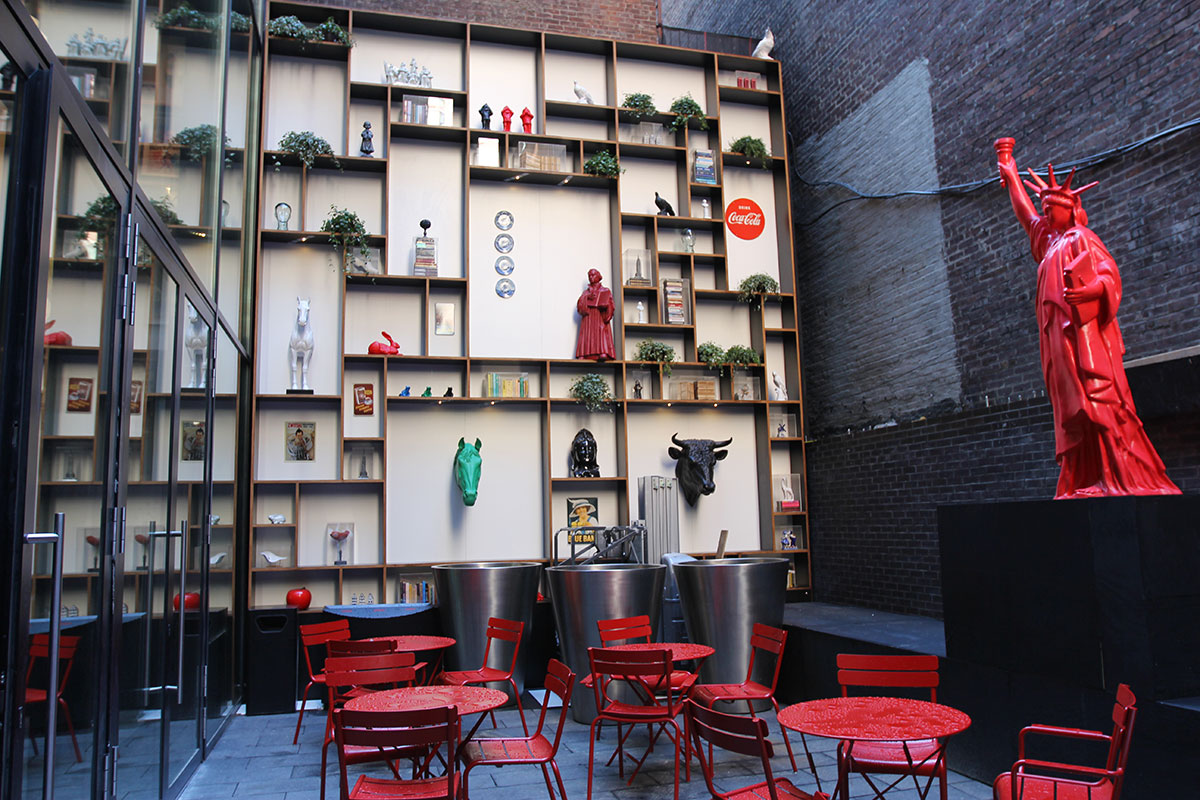
“The original name was ‘One Star is Born,'” says Chada. “It was our code name, because we didn’t believe in the star rating system, which is very old-fashioned. It’s not about the actual amenities and more about the service and experience that you get.” Star ratings shouldn’t be based on checking things off a checklist, he argues, but focusing on the quality. More isn’t better when the bathrobes are scratchy and the shower is dirty. “We really set out to start a transformational brand. Let’s challenge the status quo, let’s challenge the traditional hospitality industry. Yes, there’s been design hotels in every shape, size and form, but the thinking behind them has been very traditional in how they’re operated, distributed, marketed, etc.”

“So we started off with a completely blank piece of paper, and started with who is the consumer that we’re targeting?” continues Chadha. “That’s where the M came from: these kind of mobile citizens, people who are coming in and out of cities. They’re traveling to London, Milan, Paris, New York; they’re smart enough to have hand luggage and know they don’t need to bring their big shampoos because they know they’re going to be taken away. They’re very, very aware of what’s going on. They’re willing to pay for certain luxuries but they’re not willing to be taken advantage of, because they’re value conscious. Let’s base this whole new hotel concept on the consumer—and also name it after them.”

Luxury does not have to be material things—it’s also really about experience, emotion, efficiency.
Chadha himself a global citizen—of Indian descent, born and raised in Amsterdam, but educated in the US, working at Wall Street and Tommy Hilfiger—finds that the best inspirations came from personal experiences and observing the habits of his friends. “I always say, ‘They travel by train but drink champagne,'” Chadha remarks. “We noticed that luxury does not have to be material things—it’s also really about experience, emotion, efficiency, etc. Then we started looking at what’s frustrated us when we traveled.”

One of the first problems they tackled was getting rid of check-in lines, which no one wants to endure after a long flight. There’s no front desk at citizenM, just self check-in/check-out kiosks (similar to the ones used by many airports today), where the entire process takes less than a minute. And the person greeting you when you walk in might be shaking you a cocktail at night. The friendly hotel staff, dubbed “ambassadors,” are multi-taskers who smoothly move from role to role, and become familiar faces towards the end of your stay. “We don’t hire anyone who’s worked in a hotel before,” says Chadha. Ambassadors undergo between eight and 12 weeks of brand immersion training, including 10 days in Amsterdam and Rotterdam. “They’re all real individuals; nothing is scripted here. They’re just here to make you feel comfortable and help you—that’s actually their only job,” says Chadha.
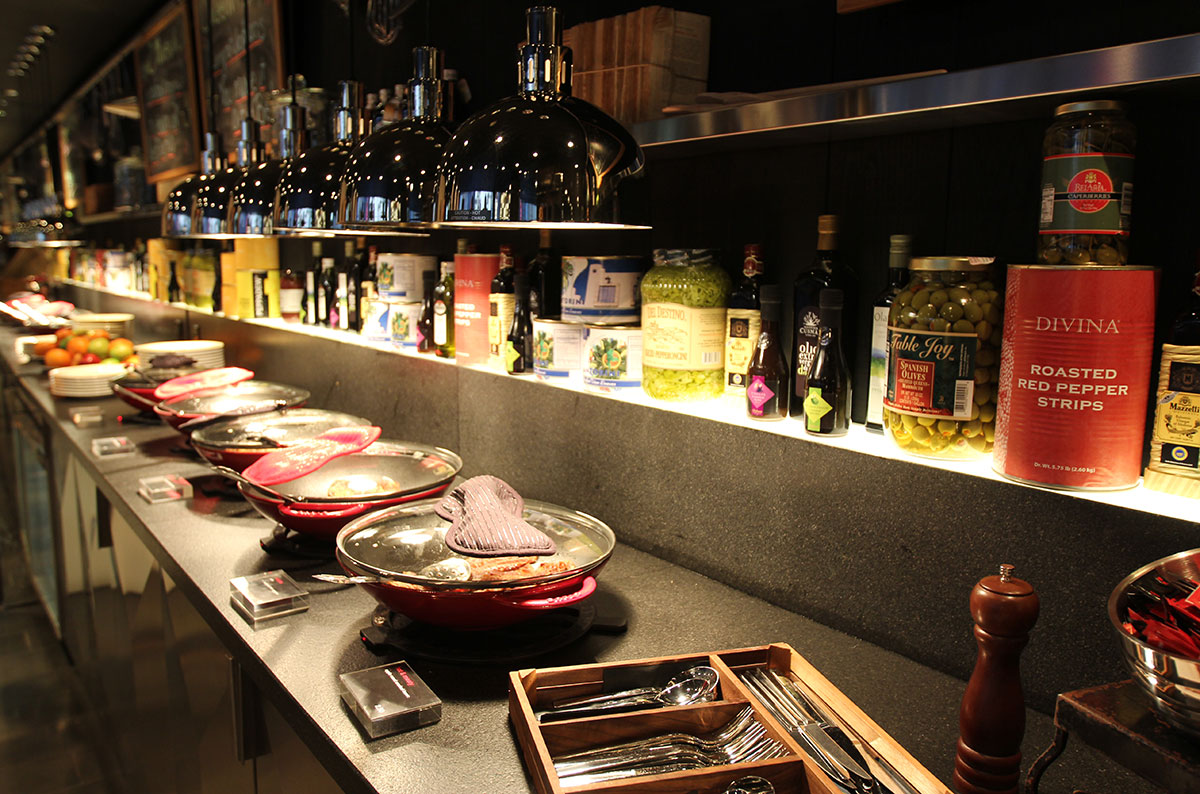
There’s nothing more frustrating then coming down to the lobby, only to find out that breakfast is no longer being served, and lunch isn’t available for a couple more hours. Chadha shared a personal experience of how difficult it was to buy a bottle of water at one of NYC’s fancy hotels; he was forced to be seated at their restaurant (due to “policy”) and order it there. “If we’re really making a hotel for this new type of traveler, then we should be as flexible as possible for them.” As a result, the canteen is open 24/7 and offers a selection of delectable grab-and-go hot food and beverages: a super efficient pitstop for travelers who have just got off their flight. And, Chadha assures us, there are no vending machines in any of the citizenM hotels.

The hotel has a go-to selection of partners that make their brand identity easily recognizable. They’ve been working with Amsterdam-based architect firm Concrete, known for doing the Supper Clubs worldwide and the Mercedes-Benz museum, since the beginning. All of the furniture, aside from some custom pieces, is from Basel, Switzerland-based designer Vitra. And thanks to the shop-in-shop structure at citizenM hotels, beloved Amsterdam-based bookstore Mendo—dubbed “porn for book lovers”—was able to expand outside the country and bring their inspiring selection of creative books to London and now New York. It’s a great alternative to gift shops that sell tacky or overpriced souvenirs.

Every citizenM hotel has a mix of commissioned artwork by local artists—inspired by the location—and also pieces from Rattan Chadha’s private art collection (over 1000 works) on permanent display. For the Times Square location, you’ll immediately see Julian Opie’s signature walking figures drawn in gold leaf; the massive “Walking in Times Square” (2014) wraps around the elevator shaft. By the Mendo bookstore is an Andy Warhol screen-print of Queen Beatrix of the Netherlands; David LaChapelle’s photographic take on Da Vinci’s “Last Supper” finds home between objects from around the world settled on the shelves. Artworks aren’t just limited to the living room area, but even the hotel rooms. On the wall is a framed “art screen”; thanks to a collaboration with Sedition Art, guests can choose different digital art works they want to be shown on the screen, like Tracy Emin’s “I Promise to Love You.” Above all, in contrast to the museum or art gallery experience, the artwork is mean to be inspirational and accessible, making guests feel included and comfortable.
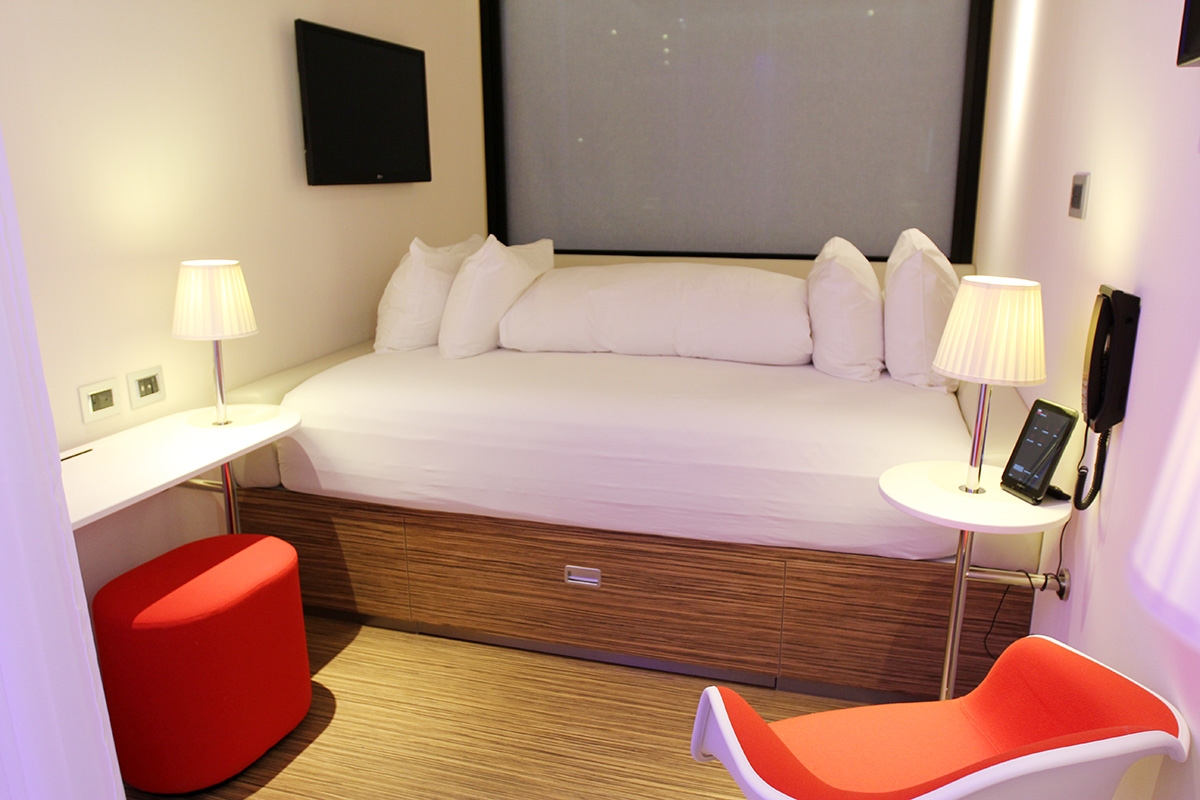
Last but not least, the rooms: there is only one type of room inside the citizenM hotel—meaning there are no suites. “Everyone’s an equal citizen; we’re very democratic,” says Chadha. When designing the rooms with Concrete, they took at picture of a five-star room and crossed off anything that was unnecessary. Bulky credenzas and dressers are swapped out with wall-hanging flat-screens (bonus: all in-room entertainment channels are free) and a drawer under the bed. With fewer pieces of furniture, the attention was focused on quality—the king-size bed is superbly comfortable, with a thick comforter and clean, smooth sheets. Although a tight squeeze, the room feels spacious as a huge window serves as the fourth wall.
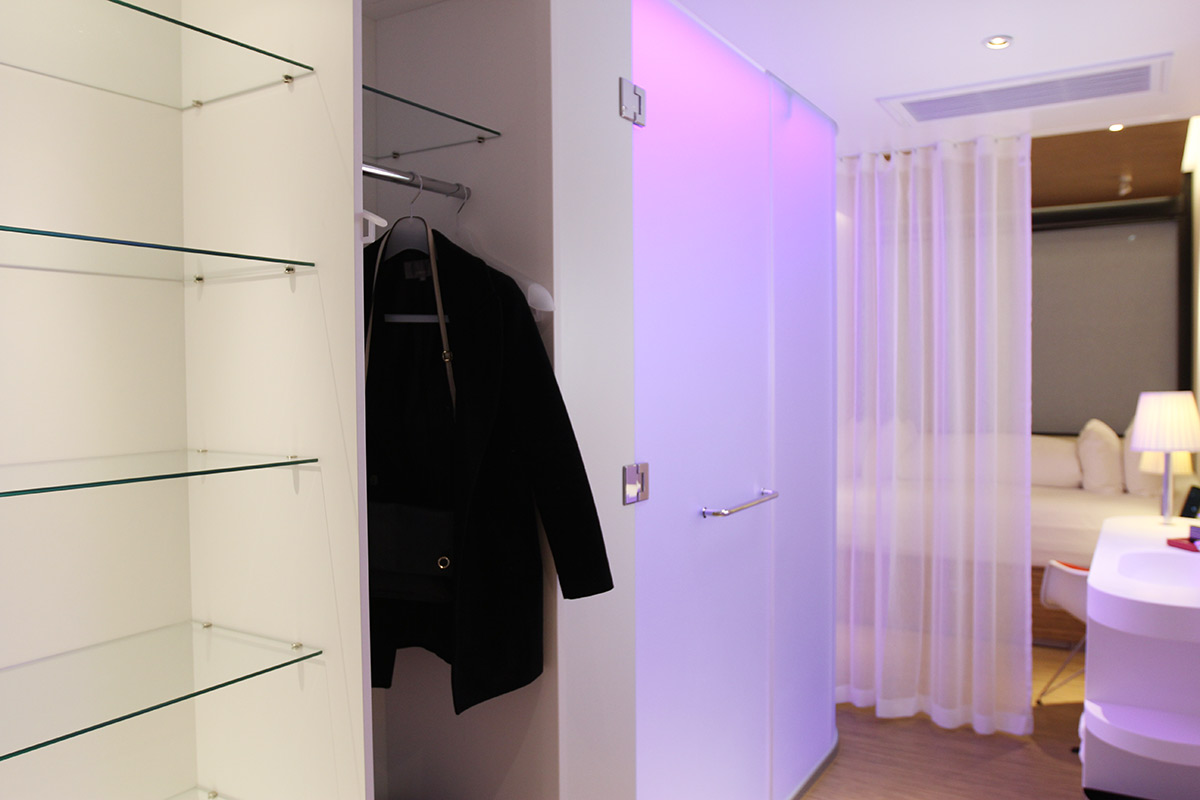
One tablet controls everything in the room—lights, temperature, alarm clock, music and television. There’s even preset moods titled “romantic,” “movies” and “party” that adjust light and blinds accordingly. And, as the icing on the cake, a kill-switch labeled “Save the Planet” is located right by the door and turns off all the lights with one touch.
Overall, citizenM Times Square has created a welcoming space for the growing number of people who are seeking affordable luxury as they travel for work and pleasure. Here’s hoping other hotel chains—old and new—will follow in a similar, transformative direction.

The Times Square citizenM is now officially open. To book a reservation, visit their website. The second Manhattan location is expected to open on the Bowery in 2016. Keep an eye out as new locations all over the world continue to open—from Charles de Gaulle Airport in Paris this June to over 50 future hotels throughout Asia.
Photos by Nara Shin












